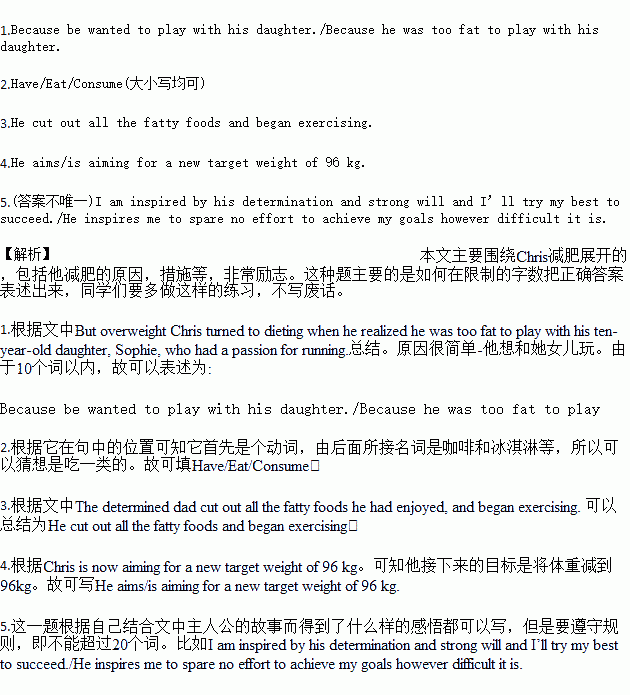题目内容
A kind father lost about 57 kg in just six months after being shamed dieting when he became too fat to play with his young daughter. Chris Willis, 47, tipped the scales at 172 kg following a lifetime of fatty foods. But overweight Chris turned to dieting when he realized he was too fat to play with his ten-year-old daughter, Sophie, who had a passion for running.
The determined dad cut out all the fatty foods he had enjoyed, and began exercising. He now weights 105 kg after losing 10 kg every month since July. Chris, who lives in Shepreth. Cambridgeshire with his wife Jackie. 51, a coach driver, said: “The hardest thing was seeing my little girl in the garden and not being able to join in because I was so unhealthy. But now I am making up for lost time---we do so much together and it is just great.”
Chris used to consume an incredible 5,000 calories a day, before he switched to healthy lifestyle. On average he would eat five slices of bread for breakfast as a mid morning meal before a full English breakfast. He would then eat a sandwich, a large pack of crisps and a pasty for lunch before chewing a whole packet of biscuits in the afternoon. For dinner Chris would demolish a curry(咖啡) and, ice cream, and also drink four pints of beer very quickly, before feeding on fatty snacks all evening.
Amazingly Chris claims he still eats the same amount---but has simply cut out the unhealthy fatty foods. Chris said: “'My family and friends have been so supportive and my wife and daughter are so pleased for me. In fact it’s them I did it for more than anyone else. The whole journey has been amazing and I am still shocked myself that I have managed to lose so much weight.” Chris is now aiming for a new target weight of 96 kg.
1.Why did Chris Willis lose weight?(no more than 10 words)
2.What does the underlined word ”demolish” mean?(1 word)
3.What measures did Chris take to lose weight? (no more than 10 words)
4.What’s Chris’ next plan for keeping healthy? (no more than 10 words)
5.How are you inspired by Chris Willis? (no more than 20 words)
 中考解读考点精练系列答案
中考解读考点精练系列答案
